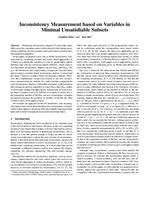LATPub479: Unterschied zwischen den Versionen
Marcel Lippmann (Diskussion | Beiträge) KKeine Bearbeitungszusammenfassung |
Marcel Lippmann (Diskussion | Beiträge) KKeine Bearbeitungszusammenfassung |
||
| (2 dazwischenliegende Versionen desselben Benutzers werden nicht angezeigt) | |||
| Zeile 13: | Zeile 13: | ||
|Note= | |Note= | ||
|Organization= | |Organization= | ||
|Pages=864 | |Pages=864-869 | ||
|Publisher= | |Publisher= | ||
|Series= | |Series= | ||
| Zeile 20: | Zeile 20: | ||
}} | }} | ||
{{Publikation Details | {{Publikation Details | ||
|Abstract=Measuring inconsistency degrees of knowledge bases (KBs) provides important context information for facilitating inconsistency | |Abstract=Measuring inconsistency degrees of knowledge bases (KBs) provides important context information for facilitating inconsistency handling. Several semantic and syntax based measures have been proposed separately. | ||
handling. Several semantic and syntax based measures have been proposed separately. | In this paper, we propose a new way to define inconsistency measurements by combining semantic and syntax based approaches. It is based on counting the variables of minimal unsatisfiable subsets (MUSes) and minimal correction subsets (MCSes), which leads to two equivalent inconsistency degrees, named IDMUS and IDMCS. We give the theoretical and experimental comparisons between them and two purely semantic-based inconsistency degrees: 4-valued and the Quasi Classical semantics based inconsistency degrees. Moreover, the computational complexities related to our new inconsistency measurements are studied. As it turns out that computing the exact inconsistency degrees is intractable in general, we then propose and evaluate an anytime algorithm to make IDMUS and IDMCS usable in knowledge management applications. In particular, as most of syntax based measures tend to be difficult to compute in reality due to the exponential number of MUSes, our new inconsistency measures are practical because the numbers of variables in MUSes are often limited or easily to be approximated. | ||
We evaluate our approach on the DC benchmark. Our encouraging experimental results show that these new inconsistency measurements or their approximations are efficient to handle large knowledge bases and to better distinguish inconsistent knowledge bases. | |||
In this paper, we propose a new way to define inconsistency measurements by combining semantic and syntax based approaches. | |||
It is based on counting the variables of minimal unsatisfiable subsets (MUSes) and minimal correction subsets (MCSes), which | |||
leads to two equivalent inconsistency degrees, named IDMUS and IDMCS. We give the theoretical and experimental comparisons between | |||
them and two purely semantic-based inconsistency degrees: 4-valued and | |||
the Quasi Classical semantics based inconsistency degrees. Moreover, the computational complexities related to our new inconsistency | |||
measurements are studied. As it turns out that computing the exact inconsistency degrees is intractable in general, we then propose | |||
and evaluate an anytime algorithm to make IDMUS and IDMCS usable in knowledge management applications. In particular, as most of syntax | |||
based measures tend to be difficult to compute in reality due to the exponential number of MUSes, our new inconsistency measures | |||
are practical because the numbers of variables in MUSes are often limited or easily to be approximated. | |||
We evaluate our approach on the DC benchmark. Our encouraging experimental results show that these new inconsistency measurements | |||
or their approximations are efficient to handle large knowledge bases and to better distinguish inconsistent knowledge bases. | |||
|ISBN= | |ISBN= | ||
|ISSN= | |ISSN= | ||
| Zeile 51: | Zeile 38: | ||
year = {2012}, | year = {2012}, | ||
} | } | ||
}} | }} | ||
Aktuelle Version vom 25. März 2015, 16:34 Uhr
Inconsistency Measurement based on Variables in Minimal Unsatisfiable Subsets
Guohui XiaoGuohui Xiao, Yue MaYue Ma
Inconsistency Measurement based on Variables in Minimal Unsatisfiable Subsets
Proceedings of European Conference on Artificial Intelligence (ECAI'12), 864-869, 2012
- KurzfassungAbstract
Measuring inconsistency degrees of knowledge bases (KBs) provides important context information for facilitating inconsistency handling. Several semantic and syntax based measures have been proposed separately.In this paper, we propose a new way to define inconsistency measurements by combining semantic and syntax based approaches. It is based on counting the variables of minimal unsatisfiable subsets (MUSes) and minimal correction subsets (MCSes), which leads to two equivalent inconsistency degrees, named IDMUS and IDMCS. We give the theoretical and experimental comparisons between them and two purely semantic-based inconsistency degrees: 4-valued and the Quasi Classical semantics based inconsistency degrees. Moreover, the computational complexities related to our new inconsistency measurements are studied. As it turns out that computing the exact inconsistency degrees is intractable in general, we then propose and evaluate an anytime algorithm to make IDMUS and IDMCS usable in knowledge management applications. In particular, as most of syntax based measures tend to be difficult to compute in reality due to the exponential number of MUSes, our new inconsistency measures are practical because the numbers of variables in MUSes are often limited or easily to be approximated.
We evaluate our approach on the DC benchmark. Our encouraging experimental results show that these new inconsistency measurements or their approximations are efficient to handle large knowledge bases and to better distinguish inconsistent knowledge bases. - Forschungsgruppe:Research Group: AutomatentheorieAutomata Theory
@inproceedings{ XiMa-ECAI-12,
author = {Guohui {Xiao} and Yue {Ma}},
booktitle = {Proceedings of European Conference on Artificial Intelligence (ECAI'12)},
pages = {864--869},
title = {Inconsistency Measurement based on Variables in Minimal Unsatisfiable Subsets},
year = {2012},
}
